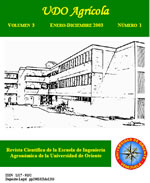
|
Revista Científica UDO Agrícola
Universidad de Oriente Press
ISSN: 1317-9152
Vol. 12, No. 1, 2012, pp. 213-220
|
 Bioline Code: cg12026
Bioline Code: cg12026
Full paper language: English
Document type: Research Article
Document available free of charge
|
|
|
Revista Científica UDO Agrícola, Vol. 12, No. 1, 2012, pp. 213-220
| es |
Rendimiento de pollos de engorde alimentados con dietas conteniendo una mezcla de hojas de yuca:harina de sangre como reemplazo de harina de soya
ADEYEMI, Olajide Ayorinde; ADEKOYA, Jamiu Adeyinka & SOBAYO, Richard Abayomi
Resumen
El ensayo investigó el desempeño de pollos de engorde con una dieta que contiene una mezcla de harina de hojas de yuca (HHY)/harina de sangre (HS) en reemplazo de harina de soya (HSY). Ciento cincuenta y dos pollos broiler de dos semanas de edad, se asignaron al azar a cinco dietas experimentales de tal manera que cada tratamiento dietético se repitió seis veces con cinco aves por repetición. Las dietas experimentales se formularon de tal manera que las mismas contenían 0, 25, 50, 75 y 100% de una mezcla HHY/HS en sustitución de la HSY, respectivamente. Las dietas se suministraron durante un período de 6 semanas. Las aves alimentadas con 100% HHY/HS en reemplazo de HSY tuvieron el mayor (P<0,05) consumo de alimento, menor ganancia de peso y la más pobre relación de conversión alimenticia que el control. La ganancia de peso y FCR fueron significativamente mayores en aves alimentadas con 50% HHY/HS en reemplazo de HSY que los otros grupos basados en las mezclas HHY/HS. Los valores para peso al canal, músculos del muslo y muslo de pollo fueron mayores (P<0,05) en las aves alimentadas con 50% de las dietas HHY/HS que en los otros grupos dietarios. El peso de la pechuga y de la grasa abdominal no fueron afectados por las dietas. El peso del hígado, riñón, corazón y bazo no fueron afectados por los tratamientos, mientras aquellos del buche, molleja, proventrículo y intestino ciego se incrementaron (P<0,05) con incrementos en la inclusión dietaria de HHY/HS en la dieta. En conclusión, se puede inferir sobre la base de las observaciones generales registradas en este estudio que las dietas de los pollos de engorde que contienen una mezcla de harina de hojas de yuca:harina de sangre en reemplazo de la harina de soya promueve un consumo de alimento diario y una relación consumo:ganancia comparable a la dieta control basada en soya y no tuvo efecto deletéreo sobre el rendimiento. Los resultados obtenidos en este ensayo mostraron que las aves en la dieta 3 (con el nivel dietario de inclusión del 50% HSY:50% HHY:HS) obtuvo la mejor respuesta en términos de ganancia de peso, consumo de alimento y relación consumo:ganancia. Se concluye que no más del 50% HHY/HS en la dieta debe ser utilizado como un reemplazo para la soya.
Palabras-clave
Rendimiento; Pollo broiler; Mezcla hojas de yuca:harina de sangre
|
| |
| en |
Performance of broiler chickens fed diets containing cassava leaf: blood meal mix as replacement for soybean meal
ADEYEMI, Olajide Ayorinde; ADEKOYA, Jamiu Adeyinka & SOBAYO, Richard Abayomi
Abstract
The trial reported herein investigated the performance of broiler chicken on diet containing cassava leaf meal (CLM)/blood meals (BM) mix in replacement for soybean meal (SBM). One hundred and fifty, two weeks–old broilers were randomly allotted to five experimental diets such that each dietary treatment was replicated six times with five birds per replicate. The experimental diets were formulated such that the diets contained 0, 25, 50, 75 and 100% CLM/BM mix as replacement for SBM respectively. The diets were fed over a 6-week period. Birds fed 100% CLM/BM replacement for SBM had the highest (P<0.05) feed intake, lower weight gain and poorer feed conversion ratio than the control. Weight gain and FCR were significantly higher in birds fed 50% CLM/BM in replacement for SBM than the other CLM/BM based groups. The values for the dressed weight, thigh muscle and drumstick were higher (P<0.05) in birds fed 50% CLM/BM diets than in the other dietary groups. The breast weight and abdominal fat were not affected by the diets. The weights of the liver, kidney, heart and spleen were not affected by the treatments whereas those of the crop, gizzard, proventriculus and caecum increased (P<0.05) with increasing dietary inclusion of CLM/BM in the diet. In conclusion, it can be inferred based on the general observations recorded in this study that broiler diets containing cassava leaf meal: blood meal mixture in replacement for soybean meal promote comparable daily feed intake and feed to gain ratio as their soybean based control diet and had no deleterious effect on performance. The results obtained in this trial showed that birds on diet 3 (with dietary level of inclusion 50% SBM: 50%CLM: BM) elicited the best response in terms of weight gain, feed intake and feed: gain ratio. It is concluded that not more than 50% of dietary CLM/BM should be used as a replacement for soybean.
Keywords
Performance; Broiler chicken; Cassava leaf: blood meal mix
|
| |
© Revista Científica UDO Agrícola
Alternative site location: http://www.udoagricola.orgfree.com
|
|
